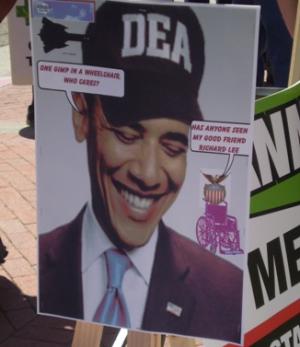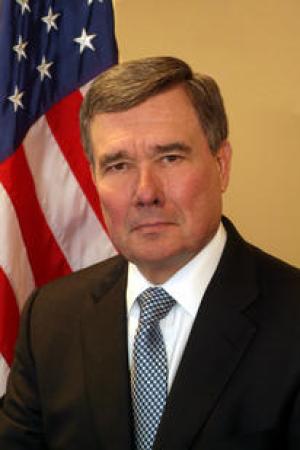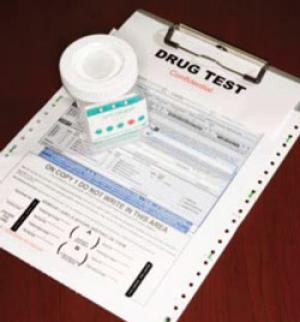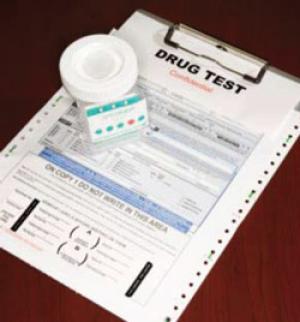Bills to drug test people seeking public benefits have been all the rage at the statehouse this year, but they're having a surprisingly hard time passing. We have some reasons why.
4/20 in Oakland was aimed squarely at the Obama administration and its attacks on medical marijuana distribution. Obama is alienating his base, protestors said, as they delivered a message to his local campaign headquarters.
The 2012 National Drug Control Strategy is out. It looks much like the 2010 strategy or the 2005 strategy or the 2000 strategy. There are a few new wrinkles, but nothing much has changed.
ProCon.org is a series of in-depth web sites presenting information and views from on current issues, several with relevance to drug policy. The Chronicle is running a series of info items from ProCon.org over the next several weeks -- this first one from medicalmarijuana.procon.org -- and we encourage you to check it out.
More DEA raids in California and Montana, and more action in the legislature in Connecticut and New Hampshire, among other medical marijuana news.
"Driving while black" continues to be an issue in Connecticut, and now, the state Senate has voted to beef up the state's 12-year-old racial profiling law, which police departments have been ignoring.
Saying that West Virginia employers can't find enough workers who aren't doped up, Gov. Tomblin has issued an executive order mandating drug tests for participants in the state's job training program. He already successfully championed drug testing for miners in the legislature.
Georgia has now followed Florida's lead in passing a bill requiring that welfare applicants undergo mandatory, suspicionless drug testing. Florida's law has been stymied by a legal challenge, and one is coming in Georgia, too.
The Dutch government plans to implement its Dutch-only "weed pass" system for cannabis coffee houses on the border on May 1, but it faces growing legal and political challenges. Not to mention, it just lost a vote of confidence.
Actor and comedian Russell Brand called for "love and compassion" for drug addicts at an appearance before a parliamentary committee in London Tuesday and suggested that decriminalization could be a good approach.
It's been a quiet week on the corrupt cop front, but we still have a pair of California cops who thought they were the Fabulous Furry Freak Brothers and an Oklahoma cop who couldn't keep his fingers out of the cookie jar---and some late-breaking news out of LA.
Events and quotes of note from this week's drug policy events of years past.
With states facing severe budget pressures, bills to require drug testing to apply for or receive public benefits -- welfare, unemployment benefits, even Medicaid -- have been all the rage at Republican-dominated state houses this year. Fail the drug test and lose your benefits. The bills carry a powerful appeal that plays well even beyond typically Republican constituencies, combining class, gender and racial stereotypes with a distaste for wasteful government spending. But they have also faced surprisingly tough opposition.

Temporary Assistance for Needy Families (TANF) workshop, District of Columbia
"If you have enough money to be able to buy drugs, then you don't need the public assistance," Colorado Rep. Jerry
Sonnenberg told the
Associated Press in March after sponsoring a welfare drug testing bill. "I don't want tax dollars spent on drugs."
"The message of this bill is simple:
Oklahomans should not have their taxes used to fund illegal drug activity,” said state Rep. Guy
Liebmann (R-Oklahoma City) in a statement on the passage of his welfare drug testing bill in the state House. "Benefit payments that have been wasted on drug abusers will be available for the truly needy as a result of this bill, and addicts will be
incentivized to get treatment."
Liebmann also struck another frequently-hit note -- a moral claim that such bills were necessary even if they didn't save taxpayer dollars. "Even if it didn't save a dime, this legislation would be worth enacting based on principle," he said. "Law-abiding citizens should not have their tax payments used to fund illegal activity that puts us all in danger."
Such rhetoric has sounded in statehouses across the land, with bills for mandatory, suspicionless drug testing of people seeking public benefits introduced in almost half the states, even passing a couple -- Florida last year led the way (and this year passed a law mandating drug tests for state employees), and now Georgia this month has followed suit. West Virginia's governor has also instituted drug testing for enrollees in the state's job training program. But the most interesting trend emerging is how difficult it is to actually get them passed.
While Georgia legislators managed to get a bill through, bills have already been defeated in nine states so far this year -- Alabama Hawaii, Iowa, Kentucky, Mississippi, South Dakota, West Virginia, Virginia, and Wyoming -- and a number of others are either dead in the water or running out of time as legislative session clocks tick down.
The states where welfare drug test bills have not yet died include Colorado (House Bill 2012-1046) , Illinois (House Bill 5364), Indiana (House Bill 1007), Kansas (House Bill 2686), Oklahoma (House Bill 2388), Ohio (Senate Bill 69) South Carolina (House Bill 4358), and Tennessee (House Bill 2725), while a "reasonable suspicion" bill is still alive in Minnesota (Senate File 1535). Bills targeting unemployment benefits are still alive in Arizona (Senate Bill 1495) and Michigan (House Bill 5412), while one aimed at Medicaid recipients is still alive in South Carolina (House Bill 4458).
The stumbling blocks for passage are threefold: First, there are serious reservations about the constitutionality of such bills. While the Supreme Court has not ruled directly on the subject of requiring drug tests of public benefits recipients, it has held that forcing someone to submit to a drug test is a search under the meaning of the Fourth Amendment and thus requires either a search warrant or probable cause. The high court has carved out only limited exceptions to this general rule, including people in public safety-sensitive positions (airline pilots, truck drivers), members of law enforcement engaged in drug-related work, and some high school students (those involved in athletics or extracurricular activities).
The only federal appeals court ruling on drug testing welfare recipients came out of Michigan a decade ago, and in that case, a divided panel found such testing unconstitutional. That case was not appealed by the state. In Florida, the welfare drug testing law passed by the Republican legislature and signed into law by Gov. Rick Scott (R), has been stopped in its tracks at least temporarily by a federal district judge who has hinted broadly she will ultimately find it unconstitutional. Civil libertarians in Georgia have vowed to challenge its law as soon as it goes into effect.
Democratic legislators across the country have used the fear of unconstitutionality as a potent argument against the drug testing bills. They have also raised the specter of legal fees reaching into the hundreds of thousands of dollars to try to defend such bills in the courts, and that leads to the second objection to public benefits drug testing bills: they will not save taxpayer dollars, but will instead waste them.
"It's absolutely ridiculous to cut people off from potential benefits, especially when we've found that people on welfare aren't using their money to feed addictions," said Morgan Fox, communications manager for the Marijuana Policy Project. "In Florida, when they enacted their program, very few people tested positive. It ends up costing the state money to drug test."
Fox was referring to findings reported last week that in the four months last year that Florida's welfare drug testing law was in effect, only 2.6% of applicants failed the drug test and fewer than 1% canceled the test. With the state reimbursing those who took and passed a drug test, the program was a net loser for the state, costing it an estimated $45,000 during that four-month period.
The Florida findings are similar to the findings of an earlier Florida pilot program for welfare drug testing and the short-lived Michigan program, both of which reported very low rates of positive drug tests among their subject populations.

drug testing lab
"Arizona is moving forward with this bill that the Department of Labor says violates federal law," said Bill Piper, national affairs director for the Drug Policy Alliance. "The trade-off for this testing is a pretty steep tax hike on local businesses, and the Chamber of Commerce is opposing it because they care about taxes. We're hoping that the Chamber in other states will look at that as well."
A third stumbling block for public benefits drug testing bills is not legal or economic, but based on notions of justice and fairness. While Republican legislators talk about ensuring that taxpayer dollars aren't wasted on drug users, they seem decidedly disinterested in imposing drug testing burdens on recipients of taxpayer largesse who are not poor. They are not calling for the drug testing of beneficiaries of corporate tax breaks, for instance, and for the most part they are demonstrably uninterested in subjecting themselves to similar testing, although Democrats opponents of the bills have had fun and scored political points sponsoring amendments or bills to do just that in some states.
In Colorado, Democratic foes of a welfare drug testing bill submitted an amendment to drug test legislators and state officials complete with personalized urine specimen cups for House committee members.That amendment actually passed the committee, but was largely symbolic because even if the bill passed in the House, it was doomed in the Democratically-controlled state Senate.
Instead of the powerful, the bills target the most downtrodden and disadvantaged -- the poor, the sick, the jobless -- in the guise of helping them. They are part of a broader attack on the poor, some advocates said.
"Whether you're talking about attacks on welfare, abortion, or contraception, it's all connected," said Lynn Paltrow, executive director of National Advocates for Pregnant Women. "Depriving low-income people, predominantly women, of basic financial support is part of creating a second class status for all women. Women can't make healthy decisions about their reproductive lives if they don't have enough food to eat for themselves and their children," she argued.
For Paltrow, the push for drug testing the poor "has been part of a concerted effort to undermine the notion of the social contract" that is ideologically-driven and mean-spirited. "Whether it's poverty or pregnancy, you make every problem one having to do with individual responsibility, and then you create a justification for taking away money from people who need it."
It's part of a larger move to privatize what should be public welfare and services, Paltrow argued. "You're transferring money from poor people to companies that do drug testing," she said. "That's an important part of trickling up all our money to the fewer than 1%."
While Paltrow saw malign forces at work, Piper could identify no grand conspiracy.
"We couldn't find any think tanks currently pushing this or any other common denominator in all the states other than that this gets media attention," he said. "Some dumb legislator reads something in the newspaper and decides to do it in his state. We don't see any indication the drug testing industry is pushing this. If there's a conspiracy, it's a conspiracy of stupidity, that's all."
There is another fairness issue in play as well. The rhetoric surrounding the politics of drug testing the poor suggests that it is aimed at mothers strung out on heroin or meth-ravaged fathers, but the most common drug cited in the failed Florida drug tests was marijuana. That gets the goat of the MPP's Fox.
"Considering that occasionally using marijuana is not going to affect your ability to be a productive member of society and that it has a low addiction potential, marijuana consumers are being kind of discriminated against," he said. "People who, for ideological reasons, would rather drug test everyone than pay for the welfare of a few people, especially when it's marijuana, why, that's just patently ridiculous."
Republican legislators may have thought they had a no-brainer of an issue with mandating drug tests for public benefits recipients, but for the reasons mentioned above, the going has been tougher than they expected. That doesn't mean no more such bills are going to make it through the legislative process -- one is very close in Tennessee -- but it doesn't suggest that pandering to stereotypes and prejudice isn't as easy a sell as they thought.
Legislators in some states have also responded by more narrowly crafting drug testing bills in hopes of passing constitutional muster. A Utah bill now signed into law requires drug tests for welfare recipients upon suspicion, and more such bills are in the pipeline, although they face the same ticking clocks as the more broadly drawn drug testing bills.
While the Republican offensive has been blunted, the battle is not over.
"I remain concerned that more states will pass stupid drug testing legislation, but still optimistic the courts will strike them down. They're trying to make them suspicion-based and less random, but even that may or may not pass court scrutiny," said Piper.
"This recession can't end quickly enough," he sighed. "When the economy is bad, they need to find scapegoats. Still, this isn't passing in most states, and to get bills passed, it may be that they have to water them down to the point where they're just not that effective."
back to top
4/20 is supposed to be a day of cannabis celebration, but in Oakland last Friday it was a day of protest and demonstration. Angered by the ongoing federal crackdown on medical marijuana distribution and shocked and infuriated by the April 2 raids on Oaksterdam University and associated businesses, protestors gathered outside the federal building in downtown Oakland to denounce the administration before marching to President Obama's Northern California campaign headquarters to deliver a letter demanding the administration cease and desist.

Delivering a message to the Obama campaign: Back off!
"Terrorist Haag Wanted for War Crimes Against Humanity," read one hand-made sign, an expression of the widespread anger against the US Attorney for Northern California, who has targeted Northern California dispensaries as part of the ongoing federal offensive against medical marijuana distribution.
Printed green, white, and red "Cannabis medicine, let states regulate" sign waved among the crowd, as chants of "Obama, keep your promise!" and "Stop the lies, legalize!" echoed through the courtyard of the towering federal building.
But it's not just marijuana advocates who are angry. "What happened here two weeks ago with the raid of
Oaksterdam was an attack on our local and our members," said Matt
Witemyre, special project union representative for
UFCW Local 5, which represents Northern California dispensary workers. "We're here to register our displeasure with the administration's actions and we're stopping by campaign headquarters to let them know we do not support these policies. We're here in solidarity with our brothers and sisters. They had good jobs and good benefits, and in the midst of the worst economic crisis in the country in decades, the administration is destroying these jobs. It makes no sense," he fumed.

Richard Lee addressing an admiring and supportive crowd.
"We're behind you 100%," said Bob Swanson, representing Oakland Supervisor Nate Miley. "We ask that President Obama back off and rein his people in. Marijuana is medicine; let the people have it. Leave Richard Lee alone -- he's a good man and had done wonders for Oakland."
Lee himself made an appearance. "This was supposed to be a day of celebration, but it's a day of protest," he said to loud cheers and cries of support.
There was also support from the other side of San Francisco Bay, with representatives of San Francisco United, a medical marijuana coalition opposing the federal attacks, standing in solidarity with their brethren in the East Bay.
"We are outraged and disgusted with what happened here two weeks ago," said SF United's Stephanie Tucker, referring to the
Oaksterdam raids. "We won't be treated this way. Obama, you are alienating your voter base. Rein in the Department of Justice and the US Attorneys. They are going after a peaceful and well-regulated community," she said to more cheers.

The president isn't winning friends in Oakland...
"We're here to protest the outrageous use of federal resources and what our federal government has done, raiding
Oaksterdam and many other well-respected and -loved cannabis establishments here in California," said
California NORML executive director Dale
Gieringer. "This is not the kind of change we were expecting from the Obama administration."
Friday was also Gieringer's birthday, and the crowd gave the veteran activist a rousing rendition of "Happy Birthday to You" to mark the occasion.
"They said they wouldn't waste Justice Department resources on medical marijuana, but we've seen DEA raids all up and down the state, we've seen Treasury attacking the banks, we've seen the IRS going after dispensaries, we've seen BATF saying that medical marijuana patients don't have the right to bear arms, we've seen the Justice Department deny that marijuana has any medical value," Gieringer continued.
"They've turned down a rescheduling petition after nine years of delay and ignored hundreds of studies to the contrary. This administration was supposed to respect science, but it's turned its back on it. This makes no sense at all, and we're going to deliver a message to the Obama administration," he said before leading the chanting, banner-waving crowd on the short march to Obama campaign headquarters.
Passing cars honked in support as the crowd gathered in front of Obama headquarters. Richard Lee's replacement as head of Oaksterdam, Dale Sky Jones, and UFCW representative Dan Rush hand-delivered a letter to campaign staffers demanding the administration cease and desist.

...and neither is US Attorney Melinda Haag.
After handing over the letter at the doorway to the campaign headquarters, the crowd lingered to chant and wave signs, making sure the campaign noticed their presence.
"The local staff has heard our cries, and they support us," said Jones. "They will take the letter we've written and deliver it straight to him."
The Obama campaign has gotten the letter, but has it gotten the message? Time will tell, but the demonstrators in Oakland Friday put the campaign on notice that the administration is losing friends in California with its attacks on medical marijuana.
(This article was published by StoptheDrugWar.org's lobbying arm, the Drug Reform Coordination Network, which also shares the cost of maintaining this web site. DRCNet Foundation takes no positions on candidates for public office, in compliance with section 501(c)(3) of the Internal Revenue Code, and does not pay for reporting that could be interpreted or misinterpreted as doing so.)
back to top
The Obama administration released its 2012 National Drug Control Strategy and accompanying 2013 drug budget Tuesday, and while the administration touted it as a "drug policy for the 21st Century," it is very much of a piece with anti-drug policies going back to the days of Richard Nixon.

Drug war spending continues to exceed treatment and prevention spending (ONDCP)
"We will continue to pursue a balanced approach… in a national effort to improve public health and safety," wrote
Office of National Drug Control Policy (
ONDCP) head Gil
Kerlikowske in the introduction to the strategy. "We will work to prevent illicit drug use and addiction before their onset and bring more Americans in need of treatment into contact with the appropriate level of care. We will continue to build on the administration’s progress in reforming the justice system, ensuring that laws are applied fairly and effectively -- protecting public safety while also ensuring that drug-involved offenders have the opportunity to end their drug use and rebuild their lives."
But that's only one half of the administration's approach. The other half, as
Kerlikowske makes clear, it continued adherence to classic war on drugs strategies.
"We will continue to counter drug
production and trafficking within the United States and will implement new strategies to secure our borders against illicit drug flows," the drug czar wrote. "And we will work with international partners to reduce drug production and trafficking and strengthen rule of law, democratic institutions, citizen security, and respect for human rights around the world."
The federal government will spend more than $25 billion on drug control under the proposed budget, nearly half a billion dollars more than this year. And despite the administration's talk about emphasizing prevention and treatment over war on drugs spending, it retains the same roughly 60:40 ratio of law enforcement and interdiction spending over treatment and prevention training that has obtained in federal drug budgets going back years. In fact, the 58.8% of the proposed budget that would go to drug war programs is exactly the same percentage as George Bush's 2008 budget and even higher than the 56.8% in Bush's 2005 budget.

ONDCP director Gil Kerlikowske
In the 2013 drug budget, treatment and early intervention programs would be funded at $9.2 billion, an increase of more than $400 billion over this year, but most of that increase is for treatment covered under the Medicaid and Medicare programs. Grant programs under the Substance Abuse and Mental Health Services Administration (
SAMHSA), including Access to Recovery, early screening and referral, and drug courts are all reduced under the 2013 budget, although drug courts would see an increase in funding under the Department of Justice's Problem Solving Justice Program.
One area where treatment funding is unequivocally increased is among the prison population. Federal Bureau of Prisons treatment spending would jump to $109 million, up 17% over this year, while the Residential Substance Abuse Treatment Program for state prisoners would be funded at $21 million, up nearly 50% over this year.
The drug strategy's rhetorical emphasis on prevention is not reflected in the 2013 budget, which calls for a 1% decrease in funding.
SAMHSA prevention grants and Drug Free Communities funding would decrease slightly, while the administration seeks $20 million to restart the much maligned and congressionally zeroed-out Youth Drug Prevention Media Campaign.
On the drug war side of the ledger, domestic anti-drug law enforcement spending would increase by more than $61 million to $9.4 billion, with the DEA's Diversion Control Program (prescription drugs) and paying for federal drug war prisoners showing the biggest increases. The administration anticipates shelling out more than $4.5 billion to imprison drug offenders.
But domestic law enforcement is only part of the drug war picture. The budget also allocates $3.7 billion for interdiction, a 2.5% increase over the 2012 budget, and another $2 billion for international anti-drug program, including assistance to the governments of Central America, Colombia, Mexico, and Afghanistan.
Critics of the continued reliance on prohibition and repression were quick to attack the new drug strategy and budget as just more of the same.
"The president sure does talk a good game about treating drugs as a health issue but so far it's just that: talk," said Neill Franklin, executive director of
Law Enforcement Against Prohibition (LEAP) and a former narcotics officer in Baltimore. "Instead of continuing to fund the same old 'drug war' approaches that are proven not to work, the president needs to put his money where his mouth is."
"This budget is appalling. The drug czar is trying to resurrect those stupid TV ads, like the one where a teenager gets his fist stuck in his mouth," said Rob
Kampia, executive director of the
Marijuana Policy Project. "The budget intentionally undercounts the federal government's expenditures on incarcerating drug offenders, who comprise more than half of the federal prison population. And the budget dangerously proposes a massive escalation in using the military to fight drugs domestically. Congress should just ignore this budget and start from scratch. Specifically, Congress should not provide the Obama administration with any money to go after nonviolent marijuana users, growers, or distributors."
In the 2013 drug strategy, the administration is highlighting a renewed emphasis on drugged driving and is encouraging states to pass "zero tolerance" drugged driving laws. It is also emphasizing attacking the massive increase in non-prescription use of
opioid pain pills.
While the strategy calls for lesser reliance on imprisonment for drug offenders, it also calls for increased "community corrections" surveillance of them, including calling for expanded drug testing with "swift and certain" sanctions for positive tests. But drug testing isn't just for parolees and probationers; the drug strategy calls for expanded drug testing in the workplace, as well.
The drug strategy acknowledges the calls for recognition of medical marijuana and marijuana legalization, but only to dismiss them.
"While the Administration supports ongoing research into determining what components of the marijuana plant can be used as medicine, to date, neither the FDA nor the Institute of Medicine has found the marijuana plant itself to meet the modern standard for safe or effective medicine for any condition," the strategy said. "The Administration also recognizes that legalizing marijuana would not provide the answer to any of the health, social, youth education, criminal justice, and community quality of life challenges associated with drug use."
For Bill Piper, director of national affairs for the
Drug Policy Alliance, the 2012 drug strategy was all too familiar.
"This strategy is nearly identical to previous national drug strategies," he said. "While the rhetoric is new -- reflecting the fact that three-quarters of Americans consider the drug war a failure -- the substance of the actual policies is the same. In reality, the administration is prioritizing low-level drug arrests, trampling on state medical marijuana laws, and expanding supply-side interdiction approaches -- while not doing enough to actually reduce the harms of drug addiction and misuse, such as the escalating overdose epidemic."
The release of the drug budget comes just days after President Obama returned from the Summit of the Americas meeting, where he was pressed to open up a debate on legalizing and regulating drugs by sitting Latin American presidents like Juan Manuel Santos of Colombia and Otto Perez Molina of Guatemala. And it comes as marijuana legalization is at the cusp of majority support and trending upward.
It is past time to keep making minor adjustments -- a slight funding increase here, a decrease there, a shift of emphasis over there -- in what is fundamentally a flawed and failed policy, said LEAP's Franklin.
"The chorus of voices calling for a real debate on ending prohibition is growing louder all the time," said Franklin. "President Obama keeps saying he is open to a discussion but he never seems willing to actually have that discussion. The time for real change is now. This prohibition strategy hasn't worked in the past and it cannot work in the future. Latin American leaders know it, and President Obama must know it. Let's stop the charade and begin to bring drugs under control through legalization."
back to top
Did you know that 16 states and the District of Columbia have laws legalizing medical marijuana? Read the details on medicalmarijuana.procon.org, part of the ProCon.org family.
Follow Drug War Chronicle for more important facts from ProCon.org over the next several weeks, or sign up for ProCon.org's email list or RSS feed.
ProCon.org is a web site promoting critical thinking, education, and informed citizenship by presenting controversial issues in a straightforward, nonpartisan primarily pro-con format.

back to top
More DEA raids in California and Montana, and more action in the legislature in Connecticut and New Hampshire, among other medical marijuana news, and the president addresses the medical marijuana crackdown. Let's get to it:
National
In an
interview with Rolling Stone published Wednesday, President Obama addressed the federal crackdown on medical marijuana distribution. The questioner is Rolling Stone publisher
Jann Wenner. Here is the exchange:
Rolling Stone: Let me ask you about the War on Drugs. You vowed in 2008, when you were running for election, that you would not "use Justice Department resources to try and circumvent state laws about medical marijuana." Yet we just ran a story that shows your administration is launching more raids on medical pot than the Bush administration did. What's up with that?
President Obama: Here's what's up: What I specifically said was that we were not going to prioritize prosecutions of persons who are using medical marijuana. I never made a commitment that somehow we were going to give carte blanche to large-scale producers and operators of marijuana – and the reason is, because it's against federal law. I can't nullify congressional law. I can't ask the Justice Department to say, "Ignore completely a federal law that's on the books." What I can say is, "Use your prosecutorial discretion and properly prioritize your resources to go after things that are really doing folks damage." As a consequence, there haven't been prosecutions of users of marijuana for medical purposes.
"The only tension that's come up – and this gets hyped up a lot – is a murky area where you have large-scale, commercial operations that may supply medical marijuana users, but in some cases may also be supplying recreational users. In that situation, we put the Justice Department in a very difficult place if we're telling them, "This is supposed to be against the law, but we want you to turn the other way." That's not something we're going to do. I do think it's important and useful to have a broader debate about our drug laws. One of the things we've done over the past three years was to make a sensible change when it came to the disparity in sentencing between crack cocaine and powder cocaine. We've had a discussion about how to focus on treatment, taking a public-health approach to drugs and lessening the overwhelming emphasis on criminal laws as a tool to deal with this issue. I think that's an appropriate debate that we should have.
California
Last Thursday, Assemblywoman Norma Torres amended her drugged driving bill, AB 2552, to remove criminal penalties for driving with the residue of marijuana or other drugs. The bill originally would have made the presence of any level of marijuana metabolites per se evidence of impairment, but will now simply divide the driving under the influence law to distinguish between drugged and drunk driving.
Also last Thursday, DEA agents raided a Murrieta dispensary for the second time in a month. Volunteers at the Greenhouse Cannabis Club were handcuffed as agents searched the building. They scored an ounce of medical marijuana, some vaporizing equipment, a computer, and some baked goods ("fake edibles") left by volunteers as a joke after the first raid. The federal raid came two days after the dispensary filed a $3 million lawsuit against the city alleging it was invading the privacy of patients. The lawsuit seeks to stop police patrols around the store and nullify the city's moratorium on collectives.
On Friday, 4/20, more than 100 demonstrators marched to Obama campaign headquarters in Oakland to protest the ongoing federal crackdown on dispensaries and the raids earlier this month on Oaksterdam University and associated businesses in particular. The marchers hand delivered a letter to campaign headquarters demanding that the federal government cease and desist.
Also on Friday, Vallejo police made their fourth dispensary raid in two months. This time they hit Life Enhancement Services and arrested its operator on marijuana distribution charges. Police are raiding dispensaries even as the city has begun taxing them with voter approval. Friday evening, a local radio station held a benefit for the Greenwell Co-op, which was raided in February.
Also on Friday, Los Angeles police raided a Topanga Canyon dispensary. Three staff members were temporarily detained at Topanga Caregivers, which was supplying a large number of patients after LAPD almost wiped out dispensaries in its Devonshire division. Police seized electronics, records, and cash in what activists called "a smash and grab" operation. It's unclear if anyone has been charged.
On Saturday, San Francisco saw an anti-dispensary rally. The unusual event was led by labor organizer Leon Chow, who is challenging incumbent Supervisor John Avalos in the November election. Chow led about 100 mostly Chinese men, women, and children on a mile-long march in opposition to three proposed medical cannabis dispensaries down the main drag of Mission Street in the Excelsior. They were met by medical marijuana advocates mobilized by the San Francisco chapter of Americans for Safe Access.
On Tuesday, the Senate Public Safety Committee approved SB 1182, which expands the list of those exempt from penalties under state law for possession, possession for sale, and transportation of medical marijuana to include cooperatives, collectives, and other business entities. The idea is to clarify that reimbursements paid to cooperatives and collectives are just as legal as those paid by patients to primary caregivers. The bill is sponsored by drug reform friend Sen. Mark Leno (D-San Francisco). It now heads for a Senate floor vote.
Colorado
On Tuesday, medical marijuana businesses and supporters held a press conference to urge President Obama to protect jobs in the state by calling off the federal crackdown on dispensaries. The press conference was organized by the National Cannabis Industry Association and was prompted by Obama's visit to Boulder on a campaign swing. Boulder has seen three dispensaries shut down after receiving threat letters from US Attorney John Walsh.
Connecticut
Last Friday, a medical marijuana bill passed a General Assembly committee vote. The bill, House Bill 5389 was approved by the Finance, Revenue and Bonding Committee on a 36-14 vote after fending off hostile amendments from medical marijuana foe state Sen. Toni Boucher (R-Wilton).
On Tuesday, the bill passed the Public Assembly committee on a 19-6 vote. It now goes before the House for a floor vote. Gov. Dan Malloy has reportedly said he will sign it if it passes. The session ends May 9.
Michigan
Last Wednesday, a state appeals court ruled against medical marijuana patients who face drugged driving charges after using their medicine. Their status as medical marijuana patients is no defense against the state's zero-tolerance drugged driving law, the court held. There are 130,000 state-registered patients in the state.
Also last Wednesday, the ACLU asked that a wrongful firing lawsuit against Walmart be reinstated. The ACLU told the US 6th Circuit Court of Appeals that its lawsuit against Walmart for firing a medical marijuana patient who used it outside of work was wrongfully dismissed by a federal district court judge. The ACLU argued that the case should be reinstated because it belonged in state court, where the group originally filed it, and because the lower court ignored the text of the state law, which prohibiting such firings.
Montana
Last Thursday, three members of a Miles City family were sentenced to federal prison for operating dispensaries. Richard Flor, 68, and reportedly suffering from dementia and depression, was sentenced to five years as a co-owner of Montana Cannabis, one of the state's largest providers. His wife, Sherry, who did the books for the operation and tended plants in the back yard, was sentenced to two years, and his son, Justin, who worked the dispensary, was sentenced to five years. Those were the harshest sentences so far in the federal prosecutions after the DEA swept the state in a series of March 2011. The sentencing judge is US District Judge Charles Lovell. Oh, wait -- there's more: The Flors must also give up their home, six vehicles, and 28 weapons, and they must pay the feds $288,000 in money they made selling medical marijuana.
Also last Thursday, US Attorney Michael Cotter issued a statement bragging that 25 people have been indicted on federal drug charges stemming from the March 2011 raids and 12 convicted and sentenced. He also promised that prosecutions will continue. His office "will continue to support investigations and prosecutions of significant traffickers of all illegal drugs, including marijuana, in an effort to disrupt and dismantle illegal drug manufacturing and trafficking networks in Montana and elsewhere," he said.
Last Friday, 4/20, DEA agents raided a Billings medical marijuana operation. Agents and local police seized an undisclosed amount of marijuana and growing equipment from the unnamed business. There was no word on any arrests. The number of medical marijuana providers in Montana has declined by more than 90% since the DEA swept the state with raids a year ago.
New Hampshire
Last Thursday, a medical marijuana bill passed a House committee vote. The bill, Senate Bill 409, passed the Republican-controlled House Health, Human Services and Elderly Affairs Committee on a 12-4 vote. It would allow patients to legally possess or grow up to six ounces of marijuana. A similar measure passed the House last year, but died in the Senate, where it did not have enough support to overcome a threatened veto by Gov. John Lynch (D). A slightly different version of this year's bill earlier passed the Senate.
On Tuesday, Gov. Lynch vowed to veto the bill if it passes. Lynch spokesman James Richardson said Tuesday that Lynch will veto the bill if it reaches his desk. Richardson said Lynch has compassion for people who believe in marijuana's benefits but is concerned about a lack of control over its distribution.
On Wednesday, the House voted 236-96 to pass the bill despite Gov. Lynch's veto threat. The bill is now expected to be referred to a second House committee for further consideration before returning to the Senate for a concurrence vote. The Senate passed SB 409 March 28 in a 13-11 vote, so support from three additional senators will be necessary to override the expected veto.
back to top
The Connecticut Senate last Thursday passed a bill to strengthen the state's 12-year-old racial profiling reporting, which some senators said was not being followed by police. The bill, Senate Bill 364, passed on a 31-3 vote.
The original racial profiling law was pushed by then-Senator Alvin Penn, who spoke out loudly against racial profiling. Penn said he himself had been stopped by police for no reason except for his skin color. Penn died of pancreatic cancer in 2003.
That law required police departments to report on each traffic stop, noting the driver's race and the reason for the stop. In the first six months the law was in effect, police wrote 315,000 reports, and a 2001 study of those reports found that blacks accounted for only 8% of the state's population, but 12% of the traffic stops.
Still, the state's top prosecutor said at the time that the numbers did not suggest racial profiling.
"We did not find a pattern of racial profiling,'' said then Chief State's Attorney John M. Bailey. "Minority drivers do not appear to be treated systematically any different than non-minority drivers.''
In the decade since then, the issue has quietly festered while police departments quietly quit reporting. According to Senate Democrats, only 27 of the state's 92 police departments are complying with the law.
Last week, the head of the Connecticut Police Chiefs Association, Douglas
Fuchs, told the
Hartford Courant that most departments were complying with the law. He added that racial profiling data does not "accurately portray how Connecticut law enforcement across the state conducts business,'' although he did not explain why not.
But former state Rep. Michael
Lawlor, who is now
Gov. Dan Malloy's (D) chief criminal justice advisor, disagreed. "The fact of racial profiling is very real. Almost every African-American has a story like that [of profiling], and very few white people do. It's real.''
Senate President Pro
Tem Donald Williams (D) also disagreed, saying, "Racial profiling is a problem in Connecticut and throughout the United States… It's time to strengthen'' the law.
The vast majority of his colleagues agreed with Williams, with only three Republicans voting against the measure. The new bill beefs up the law by requiring a standardized form from all departments, requiring reports to go to the governor's office instead of the African American Affairs Commission, and creating an advisory board to oversee compliance with the law.
The bill has now been placed on the House calendar.
back to top
It's not just Republicans hopping on the drug testing bandwagon. On Tuesday, West Virginia Gov. Earl Ray Tomblin, a Democrat, issued an executive order requiring people who seek state-funding job training to first pass a drug test.
The order turns a pledge from this year's State of the State address into reality. It calls for mandatory,
suspicionless drug testing of all participants in the Workforce West Virginia program, which provides training for youths, adults, and displaced workers.
"I continuously hear from business leaders located all across the state, that they have jobs available but the candidates cannot pass a pre-employment drug screening,"
Tomblin said in a
statement. "When this happens, we have wasted taxpayer dollars, hurt our businesses, and limit our economic growth."
Tuesday's order requires testing for 10 categories of drugs and will deny training for applicants for 90 days if they test positive. A second flunked test will bar them for one year. The order allows applicants to appeal over test results. The state will pay for the drug tests and will hire an outside contractor to administer them.
Last year, Indiana became the first state to require people seeking job training to undergo drug tests. West Virginia is so far the only other state to follow.
Tomblin has proven quite a fan of drug testing. He successfully championed a measure this year that requires random drug tests for safety-sensitive jobs in the state's coal-mining industry. The bill was part of a broader mine safety package inspired by the 2010 Upper Big Branch mine disaster in which 29 miners died. Autopsy results showed no evidence that any of those men were using drugs.
Labor leaders and other workers' rights advocates have questioned the need for drug testing. West Virginia AFL-CIO President Kenny Perdue has challenged industries to show more evidence that drug use among the state's workforce is a problem. He told the
Charleston Daily Mail he thought it was an excuse for companies to hire out-of-state.
"I do believe that the over-abuse of drugs in this state is not as bad as everybody makes it to be," Perdue said Tuesday. "I've talked to too many people and learned of too many cases that show that it's not as serious as they say."
No word yet on any legal challenges to the executive order or the miner drug testing bill.
back to top
A Georgia bill, House Bill 861, requiring applicants for welfare to first pass a drug test is now law after Gov. Nathan Deal (R) signed it Monday. It will go into effect July 1, but faces a legal challenge as soon as it does.
Georgia follows Florida in passing legislation requiring mandatory,
suspicionless drug testing of welfare applicants. The Florida law is on hold after a federal district judge questioned its constitutionality and issued a temporary restraining order while she ponders whether to make it permanent.
Backers of the Georgia law said it would be found constitutional, but it is essentially identical to the Florida law. Attorney Gerry Weber with the Southern Center for Human Rights told
Georgia Public Broadcasting the federal courts have been clear on the issue of
suspicionless drug tests.
"The Supreme Court said that there has to be a special need such as safety," he said. "Bus drivers, for example, can be subject to
suspicionless drug testing because of the safety needs of children. But just because you think a particular category of people is using drugs more than others isn't a special need under the Constitution."
Weber also noted that the court in Florida found no evidence that welfare recipients used drugs at a higher rate than the population as a whole, but bill backers said that wasn't the point.
"It's not a case of whether we think someone on welfare would want to do drugs more than anyone else," said Senator John
Albers (R-Roswell). "The whole point of the legislation is saying that if you're going to get a free entitlement or benefit from the government, you're going to have to play by the same rules as everyone else."
Weber and the Southern Human Rights Center are going to challenge the law. He said he would file suit once the state starts demanding the tests.
Georgia welfare officials estimate that some 19,000 applicants will be affected by the law in its first year of operation.
back to top
The Dutch conservative coalition government's plan to close the country's famous cannabis coffee shops to foreigners and turn them into "members only" clubs is under increasing fire from coffee shop owners and pot enthusiasts. Last week, border coffee shop owners went to court to block the restrictions, and in Amsterdam on 4/20, hundreds of coffee shop supporters staged a flash-mob smoke-in to protest the proposed changes.

Amsterdam cannabis coffee shop (wikimedia.org)
This as the conservative coalition itself collapsed Monday, with Prime Minister Mark
Rudde resigning before being named caretaker leader until new elections can be held in the fall. The coalition collapsed after a rightist anti-immigrant party pulled out in protest of economic austerity measures.
Rudde's government plans to impose the restrictions on coffee shops in three southern border provinces May 1 and extend them nationwide on January 1, 2013. They would make all coffee shops "members only," limit them to Dutch citizens and residents, and cap the number of members at each club at 2,000.
The city of Amsterdam, where the cafes are a major tourist draw, is opposed to the plan. Mayor
Eberhard Van
der Laan said the city doesn't have big problems with pot smokers and that a policy that might make sense on the border doesn't make sense in the he Dutch capital. He said he wants to negotiate some sort of compromise with the national government.
The border cities of
Tilburg,
Breda and
Maastricht also oppose the "weed pass" plan, but
Eindhoven plans to implement it. The eastern city of
Dordrecht, which is not subject to the May 1 deadline, has said it wants to adopt it anyway because it anticipates an influx of foreign buyers no longer able to go to the southern border towns.
Border coffee shop owners aren't waiting for the government to come around. Last Wednesday, they went to court in The Hague to overturn the restrictions, with their attorneys arguing that the ban on foreigners is discriminatory.
Dutch drug policy gives citizens "the fundamental right to the stimulant of their choosing" and should not deprive visiting foreigners of the same right, argued attorney
Ilonka Kamans.
But government attorney Eric
Daalder said the ban was necessary. "Fighting criminality and drug tourism is a reasonable justification," he told the court.
Marc
Josemans, a
Maastricht coffee shop owner, told the Associated Press he expected the government to lose when the court issued a decision Friday, but that if it won, he would disregard the ruling and force a test case.
"We understand that this topic is something that's of interest to tourists, but it's equally important to our Dutch customers, which is most of them," he said before the hearing. "The limits on membership are going to lead to immediate problems in cities that don't have enough coffee shops."
Two days after the coffee shops went to court, an estimated 500 people gathered in Amsterdam for a smoke-in to protest the government plan. Waving banners and t-shirts emblazoned with slogans like "Weed Pass -- No Thanks!" and "Weed Pass -- Kiss My Ass!" protestors fired up joints and listened to reggae music.
"We are here to protest against the cannabis card," said organizer Peter
Lunk. "We are legal consumers."
It's only a week until May 1, so, barring a favorable ruling in The Hague, the southern restrictions are likely to be imposed. But given that the conservative coalition pushing the restrictions has now crumbled and a new government must be elected, plans for the nationwide restrictions are looking more uncertain.
back to top
Actor, comedian, and ex-heroin addict Russell Brand appeared before a parliamentary committee in London Tuesday and told MPs that drug taking should not be approached as a "criminal or judicial matter" and that decriminalizing drug use could be "useful" in some regards.

Russell Brand at the premiere of Arthur (wikimedia.org)
Brand, 36, who recently divorced singer Katy Perry, wore a black hat, gold chains and crosses and a torn black vest top for his appearance before the committee. He called MPs "mate" and addressed them by their first names during a lively half-hour long hearing.
Brand was asked about drug legalization, but demurred, saying he didn't think he was "particularly qualified" to make that judgment. He added, however, that, "I'm not saying we should have a wacky free-for-all where everyone takes drugs, it didn't do me any good."
The flamboyant entertainer appeared before the Home Affairs Committee, which is reviewing British drug policy. The Tuesday hearing was the fourth in what the committee is calling "a comprehensive review" of the drug laws. The committee also heard from opponents of relaxing the drug laws, including columnist Peter
Hitchens and campaigner Mary Brett of
Cannabis Skunk Sense, an all-volunteer group whose mission is to "raise awareness of the continuing and growing threat to children, teenagers and their families, posed by cannabis use."
Brand, who has had a more than decade-long career as a comic in Britain, exploded on the US scene with his portrayal of heedless rock star
Aldous Snow in 2008's
Forgetting Sarah Marshall, a role he reprised and expanded on as the falling-off-the wagon rocker in
Get Him to the Greek in 2010. Brand also played the role of the alcohol-besotted title character in last year's
Arthur, a remake of the Dudley Moore classic.
But Brand has also been a thoughtful and incisive author, commentator, and radio and television host whose views have been informed by his own struggles with substances. His 2007 autobiography
My Booky Wook dealt extensively with his drug-using career and subsequent abstinence, and he won wide acclaim for his open letter
For Amy after the alcohol overdose death of Grammy award-winning chanteuse Amy Winehouse last year.
The legal status of drugs didn't matter much to addicts, Brand said. "I'm not a legal expert. I'm saying that, to a drug addict, the legal aspect is irrelevant," he said. "If you need to get drugs, you will. The criminal and legal status, I think, sends the wrong message. Being arrested isn't a lesson, it's just an administrative blip," he added.
"For me what is more significant is the way we socially regard the condition of addiction," Brand said. "It is something I consider to be an illness, and therefore more of health matter than a criminal or judicial matter. It is more important that we regard people suffering from addiction with compassion and there is a pragmatic rather than a symbolic approach to treating it."
Brand pointed to the experience of Portugal, which decriminalized drug possession in 2001, saying decriminalization could be "useful and efficient." Instead of using the "carrot and stick," Brand said, drug addiction should be approached with "love and compassion."
The committee will conduct further hearings before issuing a report.
back to top
It's been a quiet week on the corrupt cop front, but we still have a pair of California cops who thought they were the Fabulous Furry Freak Brothers and an Oklahoma cop who couldn't keep his fingers out of the cookie jar--and some late-breaking news out of LA. Let's get to it:
In Los Angeles,
two current and two former TSA screeners at LAX were arrested Wednesday by DEA agents and US marshals on federal charges they allowed large shipments of cocaine, meth, and marijuana to pass through security checkpoints. Current agents John Whitfield, 23, and
Capeline Kinney, 25, and former agents Joy White, 27, and
Naral Richardson,30, all face multiple federal drug trafficking conspiracy charges involving loads of four or more pounds of meth and 20 or more pounds of cocaine. It's unclear how they went down, but the DEA also reported it had taken one drug courier into custody and expected another one to turn himself in Wednesday.The four are accused of taking cash payments of as much as $2,400 to allow suitcases filled with dope to pass through X-ray machines at Los Angeles International Airport. All four are looking at up to life in prison.
In Alexandria, Virginia,
a California police officer and a former officer were arrested last Tuesday as they showed up to deliver 27 pounds of marijuana. Selma police officer Frederick
Sayles, 34, former Selma police officer Gabriel
Sepeda, 38, and another man were arrested by DEA agents who were part of a task force with Alexandria police. All three are charged with conspiracy to import marijuana and conspiracy to distribute marijuana. Additional charges might be pending, police said. At last report, all three men are being held without bond at the Alexandria Adult Detention Center. Preliminary hearings for them are scheduled for May 21.
In McHenry, Oklahoma,
a McHenry police officer was arrested last Tuesday on charges he stole money confiscated during a drug arrest. Police discovered the money was missing during a routine audit and zeroed in on Officer Dale
Hojnacki, 35. He is now a former officer, having resigned following his arrest, and he is charged with felony theft of more than $500. He was taken to the McHenry County Jail on a $15,000 bond. Silly officer! Only the state gets to take money in a drug arrest, not the state's agents.
back to top
April 27, 1937: In a statement before the US House of Representative Ways and Means Committee, Clinton Hester testifies that a Washington Times editorial published shortly before Congress held its first hearing on the marijuana issue argued: "The fatal marihuana cigarette must be recognized as a deadly drug and American children must be protected against it."
May 1, 1972: Nobel Prize laureate for economics Milton Friedman is quoted in Newsweek: "Legalizing drugs would simultaneously reduce the amount of crime and raise the quality of law enforcement. Can you conceive of any other measure that would accomplish so much to promote law and order?"
April 30, 1984: Colombian Minister of Justice Rodrigo Lara
Bonilla, who had crusaded against the
Medellin cartel, is assassinated by motorcycle-riding contract killers. President
Belisario Betancur, who had opposed extradition, announces, "We will extradite Colombians." Carlos
Lehder is the first to be put on the list. The crackdown forces the Ochoa family, Escobar, and
Ãscar RodrÃguez Gacha to flee to Panama for several months. A few months later, Escobar is indicted for Lara
Bonilla's murder and the
Ochoas and
RodrÃguez Gacha named as material witnesses.
April 29, 1996: At a speech at a Miami high school, President Clinton calls for a war on drugs -- for the second time. General Barry
McCaffrey, the nation's drug czar, told the Cleveland Plain Dealer on May 1 that "everything the president has announced is already being done. There's nothing new here."
May 2, 2001: The Louisiana Senate, voting 29-5, passes sweeping legislation to bring relief to an overflowing state prison system, including ending mandatory prison time for possession of small quantities of drugs.
May 1, 2003: The Illicit Drug Anti-Proliferation Act of 2003 (
IDAPA) is signed into law, among other things amending a section of the Controlled Substances Act to target rave organizers. It shifts the statute's emphasis from punishing those who establish places where drugs are made and consumed, such as "crack houses," to those who knowingly maintain "drug-involved premises," including outdoor events such as rock concerts. In addition to the criminal penalties in the original statute, the amended statute adds a civil penalty, thereby lowering the standard of proof from beyond a reasonable doubt to a preponderance of evidence.
back to top












